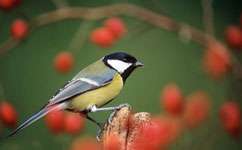Birds benefit from knowing their neighbors

Being on good terms with your neighbors well certainly has its benefits. They might water your plants while you're on holiday, feed the cat, or even put your bins out.
Now the latest study reveals that great tits get even more out of close neighborly relations.
Researchers from the University of Oxford have found that great tits that know their neighbours well tend to do better at raising their chicks to independence. What's more, females are more likely to lay more eggs, and their chicks weigh more when they finally flee the nest.
The findings will be food for thought for conservationists considering the best way to relocate endangered populations.
The scientists made their discovery after analyzing information about the birds collected over four decades from Wytham Woods in Oxfordshire in the UK.
Better the devil you know
Once they've established a territory, great tits tend to return to it year after year. There are many advantages to this strategy. The birds know where to find food, and whether or not the area is patrolled by predators.
"It's not a huge leap to expect that if they stick to the same territories, they'll be familiar with at least some of their neighbors," says Ada Grabowska-Zhang from the University of Oxford, lead author of the study.
Great tits live in fairly dense woodland. Rather than recognizing each other by sight, they're more likely to be familiar with each other's songs and calls.
Previous studies have shown that knowing the neighbors can benefit animals in lots of ways. In one classic example, scientists found that young salamanders grow more quickly when they share their hideout with salamanders they're familiar with.
While familiarity has uncovered a range of benefits, until now few studies had looked at whether familiarity had any effect on the ability to raise a healthy brood.
"Normally it's really difficult to look at reproductive success, because you need to be able to follow the same individuals throughout the course of their lives," explains Grabowska-Zhang.
Wytham Woods is owned by the University of Oxford and is probably the most heavily-studied woodland in the UK. Indeed, all of the birds are fitted with British Trust for Ornithology rings to make identifying them easier.
Data collected from the woods since 1965 gave Grabowska-Zhang and her colleagues the perfect opportunity to see if they could unpick any links between knowing your neighbors and the birds' capacity to raise their chicks successfully.
They analyzed a host of measures of reproductive success, such as how many eggs the birds laid, when they first laid an egg, and how many of their chicks reached independence.
Right now Grabowska-Zhang says they can't explain why knowing the neighbors has such a profound effect on great tits' reproductive success.
"For the males, if you're familiar with your neighbors, you don't have to spend so much time and energy renegotiating your territory, because everyone knows who owns what," she says.
Indeed scientists have shown that neighbouring birds react less aggressively to each other than to new arrivals. But she admits that this explanation is probably too simplistic. So the next step will be to investigate the mechanisms behind these behavioral differences.
"We're looking into this right now," she says.
The findings are described in Behavioral Ecology.
This story is republished courtesy of Planet Earth online, a free, companion website to the award-winning magazine Planet Earth published and funded by the Natural Environment Research Council (NERC).
More information: Ada M. Grabowska-Zhang, Teddy A. Wilkin and Ben C. Sheldon, Effects of neighbor familiarity on reproductive success in the great tit (Parus major), Behavioral Ecology, published online: December 1, 2011, doi: 10.1093/beheco/arr189
Provided by PlanetEarth Online


















